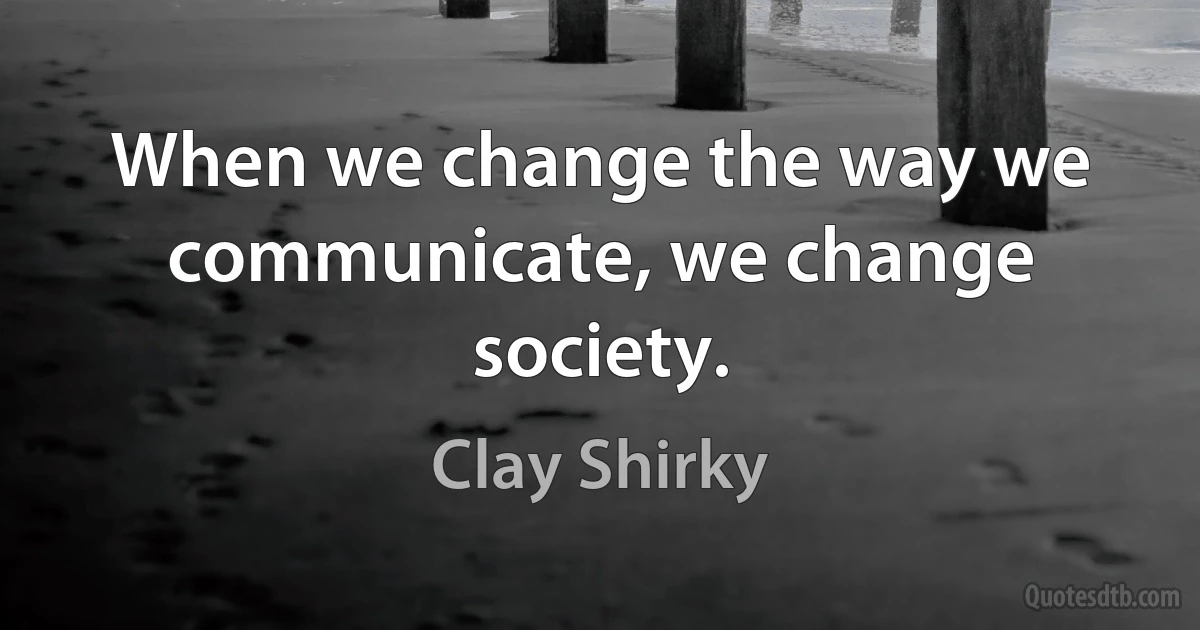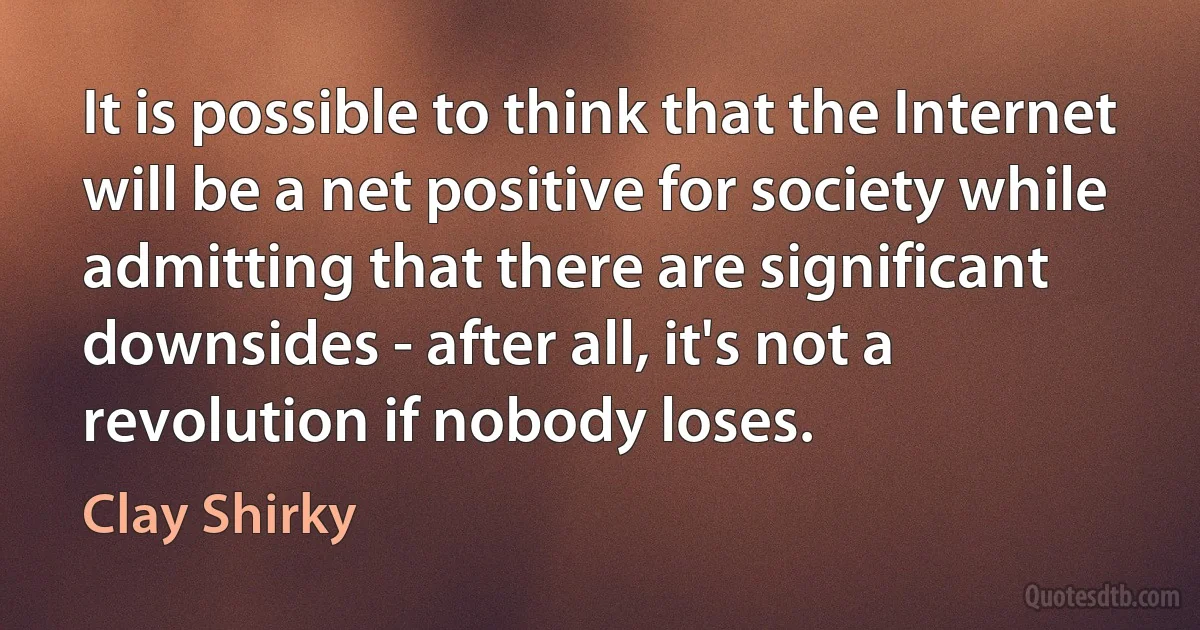Clay Shirky quotes
I would not hesitate to say I was addicted to the Internet in the first two years. It can be addictive, and things not taken in moderation have negative effects. But the alarmism around 'Facebook is changing our brains' strikes me as a kind of historical trick. Because we now know from brain science that everything changes our brains.

Clay Shirky
Because Wikipedia is a process, not a product, it replaces guarantees offered by institutions with probabilities supported by process: if enough people care enough about an article to read it, then enough people will care enough to improve it, and over time this will lead to a large enough body of good enough work to begin to take both availability and quality of articles for granted, and to integrate Wikipedia into daily use by millions.

Clay Shirky
TV is unbalanced-if I own a TV station, and you own a television, I can speak to you, but you can't speak to me. Phones, by contrast, are balanced; if you buy the means of consumption, you automatically own the means of production. When you purchase a phone, no one asks if you just want to listen, or if you want to talk on it too. Participation is inherent in the phone, and it's the same for the computer. When you buy a machine that lets you consume digital content, you also buy a machine to produce it. Further, you can share material with your friends, and you can talk about what you consumed or produced or shared. These aren't additional features; they are part of the basic package.

Clay Shirky
The typical organization is hierarchical, with workers answering to a manager, and that manager answering to a still-higher manager, and so on. The value of such hierarchies is obvious-it vastly simplifies communication among the employees. New employees need only one connection, to their boss, to get started. That's much simpler than trying to have everyone talk to everyone.

Clay Shirky
Despite the firewall, Chinese companies continue to advertise themselves on Facebook and Google-my dentist in Shanghai puts his Gmail address in scrolling LEDs in front of his practice. To do business with the rest of the world, Chinese firms increasingly have to get good at using services that are both essential and (theoretically) unavailable.

Clay Shirky
Social production is not a panacea; it is just an alternative. Although we are better off being able to use it when it is valuable, it brings its own challenges, just as production via firms and governments does. Even the simplest pooled effort or voluntary participation can be fraught with tension among the individual participants, and between those individuals and the group. Like many aspects of social life, this problem has no solution; the dilemma can be addressed only by various compromises, none of them wholly satisfactory. One way to help a group of participants improve their ability to function together is the creation and maintenance of shared culture.

Clay Shirky
At every turn, skeptical observers have attacked the idea that pooling our cognitive surplus could work to create anything worthwhile, or suggested that if it does work, it is a kind of cheating, because sharing at a scale that competes with older institutions is somehow wrong. Steve Ballmer of Microsoft denounced the shared production of software as communism. Robert McHenry, a former editor in chief of Encyclopedia Britannica, likened Wikipedia to a public rest room. Andrew Keen, author of The Cult of the Amateur, compared bloggers to monkeys. These complaints, self-interested though they were, echoed more broadly held beliefs. Shared, unmanaged effort might be fine for picnics and bowling leagues, but serious work is done for money, by people who work in proper organizations, with managers directing their work.

Clay Shirky
The problem with alchemy wasn't that the alchemists had failed to turn lead into gold-no one could do that. The problem, rather, was that the alchemists had failed uninformatively. As a group, the alchemists were notably reclusive; they typically worked alone, they were secretive about their methods and their results, and they rarely accompanied claims of insight or success with anything that we'd recognize today as documentation, let alone evidence. Alchemical methods were hoarded rather than shared, passed down from master to apprentice, and when the alchemists did describe their experiments, the descriptions were both incomplete and vague. As Boyle himself complained of the alchemists' publications, "Hermetic Books have such involved Obscuritys that they may justly be compared to Riddles written in Cyphers. For after a Man has surmounted the difficulty of decyphering the Words & Terms, he finds a new & greater difficulty to discover the meaning of the seemingly plain Expression.”.

Clay Shirky
Wiko, a French phone company, went from concept to company when the founders were shopping for parts in Shenzhen (as one does). Wiko had trouble raising money-few investors believed a new European phone company could succeed-so they took an investment from the Chinese manufacturer Tinno Mobile. Wiko is thus mostly Chinese, both owned and supplied by Tinno, but given its thin veneer of French design and marketing it looks like a local firm to the French. The resulting excitement over Wiko as a homegrown business helped them to become the second largest phone vendor in France (after Samsung, as usual). This preserves the pattern of "designed elsewhere, made in China,” but with the twist that ownership, not just sourcing and manufacturing, has now moved to China as well.

Clay Shirky


![[an Ontario-based bus company] Trentway-Wagar was arguing that because carpooling used to be inconvenient, it should always be inconvenient, and if that inconvenience disappeared, then it should be reinserted by legal fiat. Curiously, an organization that commits to helping society manage a problem also commits itself to the preservation of that same problem, as its institutional existence hinges on society's continued need for its management. Bus companies provide a critical service-public transportation-but they also commit themselves, as Trentway-Wagar did, to fending off competition from alternative ways of moving people from one place to another. (Clay Shirky)](https://cdn.quotesdtb.com/img/quotes_images_webp/15/clay-shirky-alternative-arguing-765215.webp)
